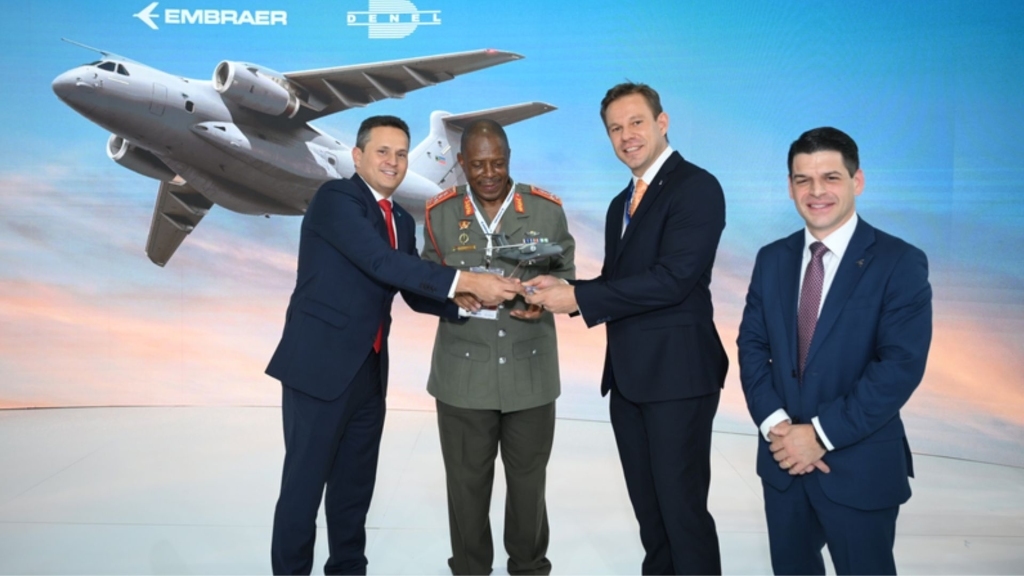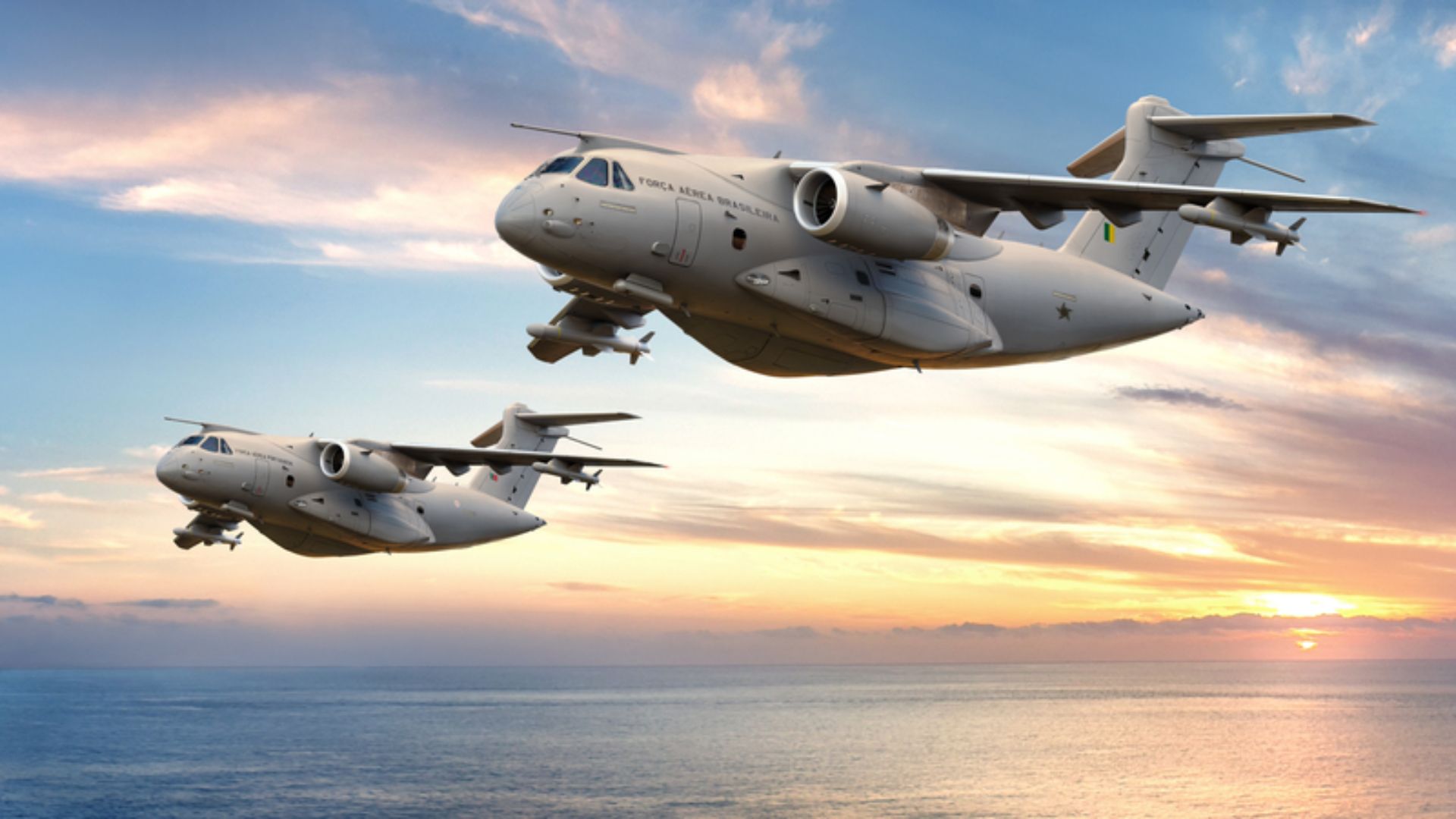Embraer and Denel have signed a Memorandum of Understanding (MoU) to explore collaboration opportunities centered on the KC-390 Millennium, Embraer’s multi-mission military transport aircraft.
The agreement, formalized during the LAAD defence and Security exhibition in Rio de Janeiro, Brazil, aims to strengthen ties between the Brazilian aerospace leader and South Africa’s state-owned defence company.
The partnership will focus on manufacturing aerostructures and establishing maintenance, repair, and overhaul (MRO) capabilities in South Africa.
The MoU reflects Embraer’s broader strategy of fostering industrial partnerships with local defence industries in key markets.
Fabio Caparica, Vice President of Contracts at Embraer defence & Security, highlighted the significance of this agreement in supporting South Africa’s efforts to modernize its military airlift capabilities.
“We are thrilled to strengthen our ties with Denel,” Caparica stated, emphasizing Embraer’s commitment to offering advanced solutions while integrating South Africa’s defence industry into the KC-390 program.
Denel’s Group Executive CEO Aerospace, Chris Boshoff, expressed similar enthusiasm for the partnership, noting Denel’s qualifications as an industrial partner capable of supporting the KC-390.
“This collaboration will further strengthen our ties and significantly enhance strategic airlift support capabilities on the African continent,” Boshoff said.
The KC-390 Millennium could be appealing for operations in South Africa due to its versatility and capacity to operate economically.
With a maximum payload capacity of 26 tons, it is larger than other military transport aircraft in its class.
The KC-390 also offers a top speed of 470 knots and an operational range capable of fulfilling missions such as humanitarian aid delivery, troop transport, cargo airdrop, air-to-air refueling, medical evacuation, firefighting, search and rescue (SAR), and special operations.
Its design allows for rapid reconfiguration between missions, enhancing its utility for modern air arms.
Since entering service with the Brazilian Air Force in 2019, the KC-390 has demonstrated exceptional reliability and operational performance. The aircraft boasts a mission completion rate exceeding 93%, underscoring its dependability in diverse operational scenarios.
It has been acquired by eight countries – Brazil, Portugal, Hungary, South Korea, the Netherlands, Austria, the Czech Republic, and an undisclosed customer – and has been selected by Sweden and Slovakia for their air force modernization programs.
The MoU with Denel aligns with Embraer’s approach of offering co-production and offset arrangements to attract buyers. Notably, South Africa is currently in talks with Embraer regarding a potential purchase of the KC-390 as part of its plan to replace aging transport aircraft.
The partnership with Denel could serve as a stepping stone toward finalizing this deal by integrating South African industry into the production and sustainment framework for the KC-390..
Notes and Comments
The Embraer-Denel MoU represents a continuation of Embraer’s emerging strategic approach to positioning the KC-390 Millennium in the global market.
The aircraft has been steadily gaining traction in the medium-lift military transport segment, with its order book expanding to include eight confirmed customers and additional countries officially selecting the platform for future acquisition.
At the core of Embraer’s apparent market strategy is a focus on industrial cooperation rather than straightforward aircraft sales. This approach constitutes a form of ‘mutual enablement,’ so to speak, where Embraer isn’t simply looking to sell aircraft but to cultivate industrial partnerships with its customers.
The Denel agreement exemplifies this strategy – by incorporating South African industry into the KC-390 program through aerostructures manufacturing and MRO capabilities, Embraer creates value propositions that extend well beyond the aircraft itself.
This collaborative model appears particularly effective for engaging with countries seeking to develop or maintain their domestic aerospace industries.
For South Africa, which has a substantial aerospace sector with Denel as its flagship company, the opportunity to participate in production and sustainment activities for a modern military transport aircraft offers significant benefits for industrial retention and development.
The concept of mutual enablement potentially provides a competitive advantage for “middle power” aerospace manufacturers like Embraer against competitors with larger economies of scale.
While countries like China can leverage their massive domestic manufacturing base and internal market to drive down costs, companies like Embraer must find alternative value propositions.
By offering meaningful industrial participation, technology transfer, and creating ecosystem benefits within customer countries, Embraer can differentiate its offerings in ways that pure price competition might not permit.
This approach may be particularly relevant when competing against Chinese aerospace manufacturers, who often leverage significant cost advantages.
Rather than engaging in direct price competition, Embraer appears to be creating partnerships that generate economic and strategic benefits for customer nations that extend beyond the initial procurement cost.
The willingness to share production and distribute industrial benefits creates stakeholders within the customer country who derive value from the relationship.
South Africa’s interest in the KC-390 should be viewed within this framework. While the country needs to replace aging transport aircraft, the potential industrial collaboration with Denel represents a significant factor in any procurement decision.
The MoU with Denel effectively transforms the procurement conversation from a simple purchase of aircraft to a strategic partnership with cascading benefits for South Africa’s aerospace sector.
The KC-390’s technical capabilities make it well-suited for African operational environments. Its ability to operate from unprepared runways, substantial payload capacity, and multi-mission flexibility address practical requirements for military transport operations across the continent.
These capabilities, combined with industrial participation, create a compelling value proposition specifically tailored to South Africa’s needs.
Embraer’s collaborative strategy mirrors successful approaches used by other aerospace manufacturers from middle-power countries. Turkish Aerospace Industries, for example, has pursued similar partnerships to expand its footprint beyond its domestic market.
These strategies typically emphasize technology sharing, co-development, and industrial participation to create relationships that are more resilient to purely cost-based competition.


